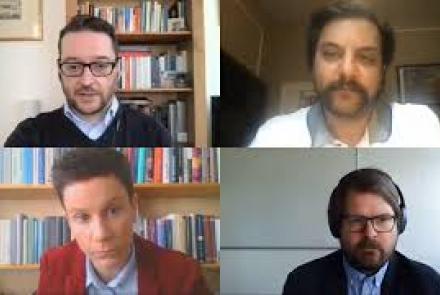Lesson type
Difficulty level
Course:
This lecture covers the needs and challenges involved in creating a FAIR ecosystem for neuroimaging research.
Difficulty level: Beginner
Duration: 12:26
Speaker: : Camille Maumet
Course:
This lecture covers multiple aspects of FAIR neuroscience data: what makes it unique, the challenges to making it FAIR, the importance of overcoming these challenges, and how data governance comes into play.
Difficulty level: Beginner
Duration: 14:56
Speaker: : Damian Eke
Course:
The International Brain Initiative (IBI) is a consortium of the world’s major large-scale brain initiatives and other organizations with a vested interest in catalyzing and advancing neuroscience research through international collaboration and knowledge sharing. This workshop introduces the IBI, the efforts of the Data Standards and Sharing Working Group, and keynote lectures on the impact of data standards and sharing on large-scale brain projects, as well as a discussion on prospects and needs for neural data sharing.
Difficulty level: Intermediate
Duration: 2:06:58
Course:
Panel of experts discuss the virtues and risks of our digital health data being captured and used by others in the age of Facebook, metadata retention laws, Cambridge Analytica and a rapidly evolving neuroscience. The discussion was moderated by Jon Faine, ABC Radio presenter. The panelists were:
- Mr Sven Bluemmel, Victorian Information Commissioner
- Prof Judy Illes, Neuroethics Canada, University of British Columbia, Order of Canada
- Prof Mark Andrejevic, Professor of Media Studies, Monash University
- Ms Vrinda Edan, Chief Operating Officer, Victorian Mental Illness Awareness Council
Difficulty level: Intermediate
Duration: 1:10:30
In this interdisciplinary panel discussion, panelists explored and discussed the technical, ethical, and legal dimensions of brain data governance and neurorights.
Difficulty level: Beginner
Duration: 1:00:14
Course:
Open Brain Consent is an international initiative aiming to address the challenge of creating participant consent language that will promote the open sharing of data, protect participant privacy, and conform to legal norms and institutional review boards.
Open Brain Consent addresses the aforementioned difficulties in neuroscience research with human participants by collecting:
- widely acceptable consent forms (with various translations) allowing deposition of anonymized data to public data archives
- collection of tools/pipelines to help anonymization of neuroimaging data making it ready for sharing
Difficulty level: Beginner
Duration:
Speaker: :
This lecture covers how you can make your data public through EBRAINS. This talk focuses on the ethical considerations for sharing data, the requirements that are imposed by various regulations, particularly for sharing human data. The lecture also includes a discussion of how EBRAINS designs its services to deal with the ethical and regulatory aspects of sharing these kinds of data.
Difficulty level: Intermediate
Duration: 16:15
Speaker: : Maaike van Swieten and Jan Bjaalie
This lecture discusses the challenges of protecting hospital data.
Difficulty level: Intermediate
Duration: 12:48
Speaker: : Franck Calcavecchia
This lecture discusses differential privacy and synthetic data in the context of medical data sharing in clinical neurosciences.
Difficulty level: Intermediate
Duration: 20:26
Speaker: : Minos Garofalakis
Topics
- Artificial Intelligence (7)
- Philosophy of Science (5)
- Provenance (3)
- protein-protein interactions (1)
- Extracellular signaling (1)
- Animal models (8)
- Assembly 2021 (29)
- Brain-hardware interfaces (14)
- Clinical neuroscience (40)
- International Brain Initiative (2)
- Repositories and science gateways (11)
- Resources (6)
- General neuroscience
(62)
- Neuroscience (11)
- Cognitive Science (7)
- Cell signaling (6)
- Brain networks (11)
- Glia (1)
- Electrophysiology (41)
- Learning and memory (5)
- Neuroanatomy (24)
- Neurobiology (16)
- Neurodegeneration (1)
- Neuroimmunology (1)
- Neural networks (15)
- Neurophysiology (27)
- Neuropharmacology (2)
- Neuronal plasticity (16)
- Synaptic plasticity (4)
- Visual system (12)
- Phenome (1)
- General neuroinformatics
(27)
- Computational neuroscience (279)
- Statistics (7)
- Computer Science (21)
- Genomics (34)
- Data science
(34)
- Open science (61)
- (-) Project management (8)
- Education (4)
- Publishing (4)
- Neuroethics (42)







